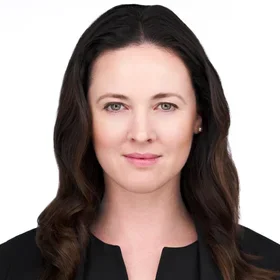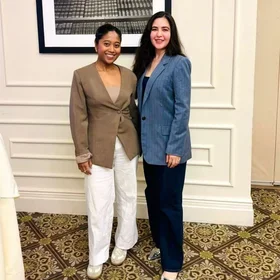Jessica Jones ('13) had been an accountant for two years, but she wanted to transition to the tech industry. She looked to PR and marketing as a path to the quickly growing sector, but she had no experience in communications. That’s where Columbia’s M.S. in Communications Practice program (now the M.S. in Strategic Communication) came in.
She relocated from the San Francisco Bay Area to New York City to take part in the program. The location and the Columbia network allowed her unprecedented access to opportunities in the New York media and communications industry.
Jessica says that she’s grateful for the training and the connections that the program afforded her. She interned in the corporate communications department of the digital advertising agency R/GA, among other accomplishments. Ultimately, one of Jessica’s professors helped her land her current role at the tech-focused boutique consultancy Jones-Dilworth in Austin, TX.
Jessica spoke with us over the phone from Austin about her time at Columbia, and what it means to handle marketing and PR for the start-ups of today and the tech giants of tomorrow.
What led you to pursue the program?
I was working at a Big Four accounting firm. I liked what I did, but I was curious about PR and marketing, specifically in the tech industry. I'd read about South by Southwest, so one year, I attended. I was really intrigued by the conversations around marketing and technology, and I wanted to do that for a living. I saw the Columbia program as a way to get my feet wet in the PR industry. That's when I decided to pursue the program.
Why did you choose Columbia?
I've always wanted to live in New York. More importantly, it was the network and the opportunities that I felt like living in New York would present. For instance, I would get the chance to reach out informally to people in the industry in New York: "I want to learn more about what you do. Would you want to grab coffee?" I felt like it would be much easier to do that in New York than in other places.
Which classes were particularly helpful for you?
One was with my former professor Amy Inzanti [who taught Dynamics of Persuasion]. Learning about her experiences specifically was very insightful because she works with a lot of data [as Senior Vice President of Insights and Strategy at Cohn & Wolfe]. I had been an accountant, so being able to incorporate numbers into a new career was something that I wanted to explore. She was the one who eventually helped me network and get me the job that I have today.
I also really liked Steve Jarmon’s class. We visited different firms and agencies; we got to talk to professionals directly and get firsthand insight into what their experiences were like.
Can you tell me about the agency that you work for?
Yeah! I work for Jones-Dilworth, which is a boutique agency based in Austin. What we do here is actually a great mix of what I learned in the Columbia program. We’re a PR agency that works almost exclusively with early-stage tech start-ups. Because a lot of start-ups don't have the resources that a larger company would, we basically end up acting as their outsourced marketing department. In addition to traditional PR, we do corporate communications and marketing. We do paid media, and we do a lot of content marketing strategy development and execution.
Working with these emerging start-ups must be a pretty interesting place to be.
Yeah, especially because, for the most part, the world doesn't even know that these companies exist yet. We're preparing them to launch into the world. To help them get discovered is really fun. For example, our agency worked with Siri before they were bought out by Apple. We were able to help them structure their PR and marketing in such a way that people found out about them. That’s a big part of how they got to where they are today.
How do you get the word out about these companies?
We build out a really thoughtful media strategy. A lot of that includes traditional media relations. We pitch the big tech and mainstream publications. A lot of it is thought leadership, making sure that they write blog posts or contribute content to these publications.
People generally expect to see who these people are, what their vision is. Then we build up to [the point where] these publications write about what’s actually launching.
It's a gradual introduction into the world. It’s not about the products, it's about the people behind it.


